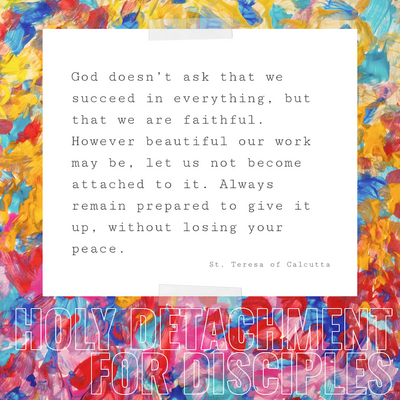The Making Disciples Today Blog has reflections to help you grow in your journey of missionary discipleship, reviews on recommended Catholic evangelization resources, and practical insight on how to evangelize in your daily life.
- Details
- Written by Burning Hearts Team
Holy Week @home
During Holy Week, the Church celebrates the mysteries of salvation accomplished by Christ in the last days of his earthly life, beginning with the triumphal entry into Jerusalem. For nearly 40 days, the Christian faithful have practiced the disciplines of Lent: prayer, fasting, and almsgiving. Now the Church invites us to an even deeper spirit of prayer as we follow Christ on his journey to the Cross.
Traditions - especially those children can see, hear, feel, smell and taste -- provide vivid and lasting impressions for all members of the family. Take advantage of all the 'smells and bells' of Holy Week to help everyone in your family celebrate the holiest time of year.
 However, please remember that the holiness of your Holy Week doesn't depend on how many crafts or prayer services you do with your family.
However, please remember that the holiness of your Holy Week doesn't depend on how many crafts or prayer services you do with your family.
It doesn't depend on having kids who are willing to sit and listen to lengthy Scripture readings or on your ability to focus during long services.
The holiness of your Holy Week doesn't depend on anything you DO at all. It depends completely on your willingness to surrender yourself to Jesus' love.
Time each day this week to open your heart to Jesus' extravagant, overwhelmingly abundant, self-sacrificing love for you. Ask Him to fill you with His love and to fill even the darkest, most discouraged, most shame-filled corners of your heart with the light of His love.
Then, allow that light and love to overflow from you to those around you.
If we each loved the people in our homes and in our loves with more intentionality and extravagance this week - if we just loved them with Jesus' love poured into our own hearts - then, this year's Holy Week will be the holiest ever.
- Details
- Written by Kristin Bird
Did you know...? According to some historical accounts, if you’ve ever pulled a prank on April Fool’s Day, you have the Catholic Church to thank.
In 1582, Pope Gregory XIII issued a decree ordering that all Christian nations adopt a standardized calendar. This new "Gregorian calendar" moved the new year from the end of March to the first of January. If you've ever misdated a January check, you can likely empathize with the confusion this caused for some folks in the years that followed. Those who didn't know about the change, didn't want to observe it, or simply forgot about it were mocked as “fools” when they mistakenly celebrated the new year on April 1.
A French tradition that dates back to this era may have been the start of the pranks we traditionally play on this day. Some writers suggest that those who adopted the new calendar began tricking those who didn't by sending them on foolish errands, playing practical jokes on them, or attaching fish to their backs (symbolizing a young, easily caught fish / a gullible person).
However, we can dig deeper into April Fools Day and consider it more than just a day to play pranks. The whole notion of foolishness has a long tradition with deep meaning in the Christian tradition, and reflecting on them can help us grow in our journey of discipleship.
- Details
- Written by Burning Hearts Team
How Accompaniment Can Help You Grow This Lent
The forty days of Lent can seem like a long time, especially if one is giving up a favorite food or video game. It's helpful to have a friend to keep us going. He or she can encourage us, challenge us, and pick us up if we falter. In fact, that kind of accompaniment - a holy friendship developed out of mutual love for one another and a desire to walk with one another into deeper relationship with Jesus - is the heart of evangelization and discipleship.
- Details
- Written by Kristin Bird
There is a cost of discipleship — Jesus sometimes calls us to leave behind professions, friends, even family. Does that mean that work and human relationships are at odds with growing in our relationship with God? The concept of detachment can help us understand this problem.
Jesus calls us to put God first, above everyone and everything else. And that’s really the point of the virtue we call “detachment.” Detachment is the opposite of attachment. If we get too attached to someone or something, we cannot let that person or object go, even when such letting go is necessary. We must be detached enough from other people and possessions, Jesus insists, that they cannot interfere with following God’s will.




